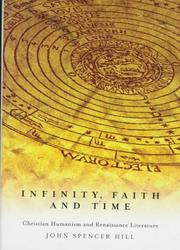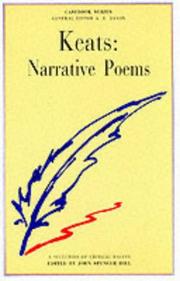| Listing 1 - 10 of 10 |
Sort by
|
Book
ISBN: 0333237684 Year: 1979 Publisher: London Macmillan
Abstract | Keywords | Export | Availability | Bookmark
 Loading...
Loading...Choose an application
- Reference Manager
- EndNote
- RefWorks (Direct export to RefWorks)
Milton, John --- Vocation in literature --- Christian literature, English --- -Vocation --- -Calling --- Vocational guidance --- Duty --- Ethics --- Occupations --- Work --- English Christian literature --- English literature --- History and criticism --- Christianity --- -History of doctrines --- -Religious aspects --- -Criticism and interpretation --- Vocation in literature. --- Vocation --- History and criticism. --- History of doctrines --- Milton, John, --- Criticism and interpretation. --- -History and criticism --- -Milton, John --- -English Christian literature --- Calling --- Religious aspects --- Milṭan, Jān, --- Milʹton, Dzhon, --- Милтон, Джон, --- Miltūn, Zhūn, --- Miltonus, Joannes, --- J. M. --- M., J. --- Milʹton, Īoann, --- Milton, Gioanni, --- Milton, Giovanni, --- מילטאן, יאהאן --- מילטאן, יוחנן --- מילטון, ג׳והן --- מלטן, יוחנן
Book
ISBN: 0333212347 0333212355 9780333212356 9780333212349 Year: 1977 Publisher: London: MacMillan,
Abstract | Keywords | Export | Availability | Bookmark
 Loading...
Loading...Choose an application
- Reference Manager
- EndNote
- RefWorks (Direct export to RefWorks)
Poetry --- English literature --- anno 1800-1899 --- English poetry --- -Romanticism --- -Pseudo-romanticism --- Romanticism in literature --- Aesthetics --- Fiction --- Literary movements --- History and criticism --- -History and criticism --- Romanticism --- 19th century --- Great Britain
Book
ISBN: 0333237692 9780333237694 Year: 1983 Publisher: [Lieu de publication inconnu]: [éditeur inconnu],
Abstract | Keywords | Export | Availability | Bookmark
 Loading...
Loading...Choose an application
- Reference Manager
- EndNote
- RefWorks (Direct export to RefWorks)
Book
ISBN: 0333219961 Year: 1978 Publisher: Macmillan
Abstract | Keywords | Export | Availability | Bookmark
 Loading...
Loading...Choose an application
- Reference Manager
- EndNote
- RefWorks (Direct export to RefWorks)

ISBN: 1282854712 9786612854712 0773566813 9780773566811 0773516611 9780773516618 9781282854710 6612854715 Year: 1997 Publisher: Montreal [Que.] Buffalo, NY McGill-Queen's University Press
Abstract | Keywords | Export | Availability | Bookmark
 Loading...
Loading...Choose an application
- Reference Manager
- EndNote
- RefWorks (Direct export to RefWorks)
In Part 1 Hill examines the effect of the idea of spatial infinity on seventeenth-century literature, arguing that the metaphysical cosmology of Nicholas of Cusa provided Renaissance writers, such as Pascal, Traherne, and Milton, with a way to construe the vastness of space as the symbol of human spiritual potential. Focusing on time in Part 2, Hill reveals that, faced with the inexorability of time, Christian humanists turned to St Augustine to develop a philosophy that interpreted temporal passage as the necessary condition of experience without making it the essence or ultimate measure of human purpose. Hill's analysis centres on Shakespeare, whose experiments with the shapes of time comprise a gallery of heuristic time-centred fictions that attempt to explain the consequences of human existence in time. Infinity, Faith, and Time reveals that the sixteenth and seventeenth centuries were a period during which individuals were able, with more success than in later times, to make room for new ideas without rejecting old beliefs.

ISBN: 0333276779 Year: 1983 Publisher: London : MacMillan,
Abstract | Keywords | Export | Availability | Bookmark
 Loading...
Loading...Choose an application
- Reference Manager
- EndNote
- RefWorks (Direct export to RefWorks)
Book
Year: 1977 Publisher: London, Basingstoke MacMillan
Abstract | Keywords | Export | Availability | Bookmark
 Loading...
Loading...Choose an application
- Reference Manager
- EndNote
- RefWorks (Direct export to RefWorks)
Book
Year: 1978 Publisher: London - Basingstoke Macmillan
Abstract | Keywords | Export | Availability | Bookmark
 Loading...
Loading...Choose an application
- Reference Manager
- EndNote
- RefWorks (Direct export to RefWorks)
Book
ISBN: 9780333276761 0333276760 Year: 1983 Publisher: London: MacMillan,
Abstract | Keywords | Export | Availability | Bookmark
 Loading...
Loading...Choose an application
- Reference Manager
- EndNote
- RefWorks (Direct export to RefWorks)
Digital

ISBN: 9781442674417 Year: 2018 Publisher: Toronto, Ont. University of Toronto Press
Abstract | Keywords | Export | Availability | Bookmark
 Loading...
Loading...Choose an application
- Reference Manager
- EndNote
- RefWorks (Direct export to RefWorks)
| Listing 1 - 10 of 10 |
Sort by
|

 Search
Search Feedback
Feedback About UniCat
About UniCat  Help
Help News
News